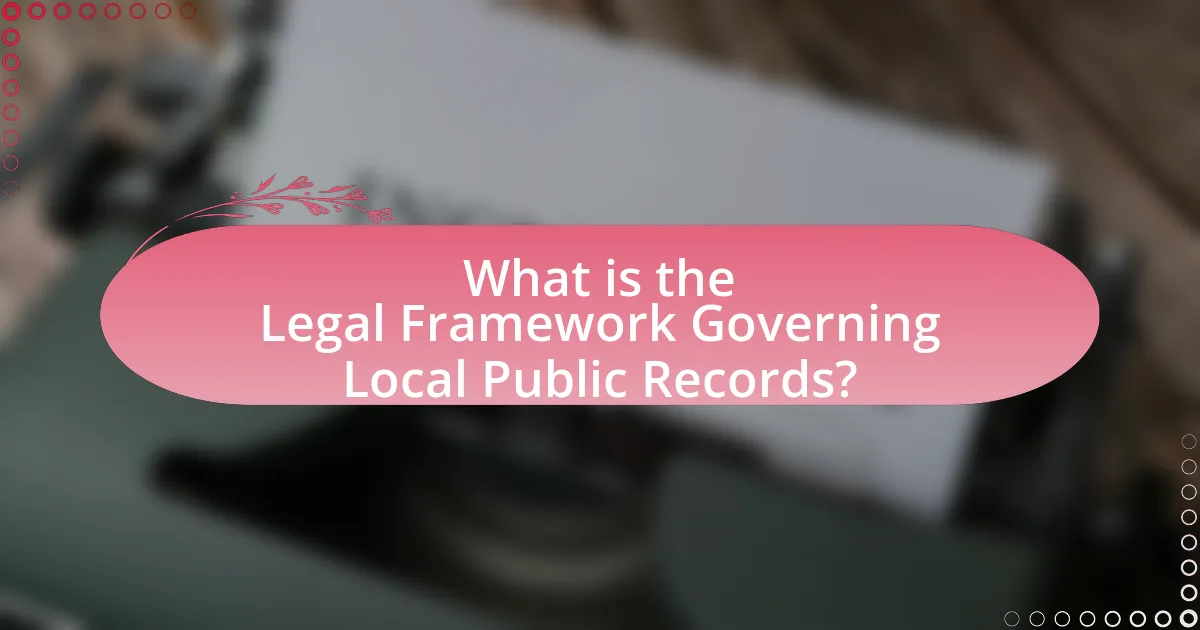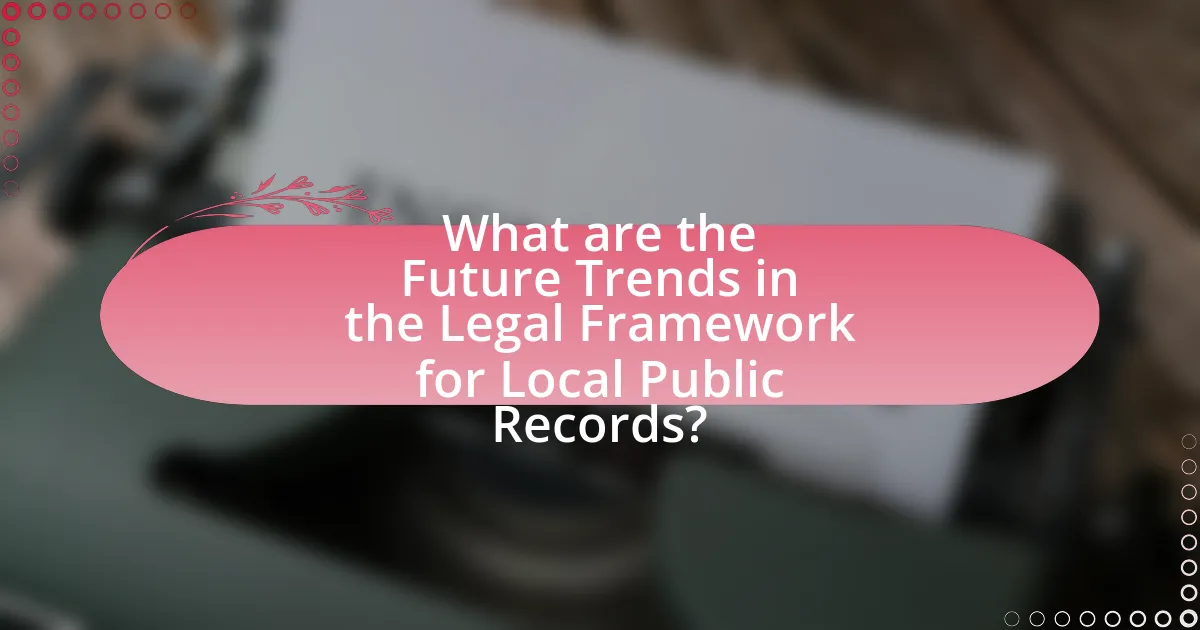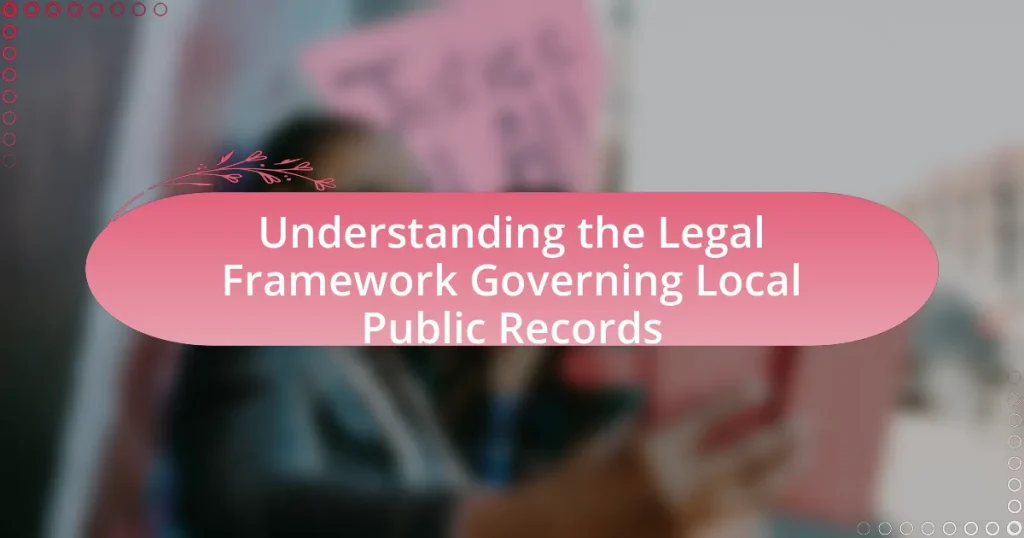The article focuses on the legal framework governing local public records, which is primarily shaped by state laws, federal regulations, and local ordinances. It outlines the importance of transparency and accountability in government operations, emphasizing key laws such as the Freedom of Information Act (FOIA) and the Privacy Act. The article discusses how federal, state, and local laws interact, the challenges faced in accessing public records, and the processes for managing these records. Additionally, it highlights the role of technology in enhancing public records management and the best practices local governments can adopt to improve accessibility while addressing privacy concerns.

What is the Legal Framework Governing Local Public Records?
The legal framework governing local public records primarily consists of state laws and regulations that dictate the creation, maintenance, and accessibility of public records. Each state in the U.S. has enacted its own public records laws, often referred to as “sunshine laws,” which establish the rights of citizens to access government documents and the obligations of public agencies to provide that access. For example, the Freedom of Information Act (FOIA) at the federal level sets a precedent for transparency, influencing state-level legislation. Additionally, local ordinances may further define the specifics of public record management within municipalities, ensuring compliance with both state and federal guidelines.
How is the legal framework defined and established?
The legal framework is defined and established through a combination of statutes, regulations, and judicial interpretations that govern the creation, maintenance, and accessibility of local public records. Statutes enacted by legislative bodies outline the specific requirements for public records, while regulations provide detailed procedures for compliance. Judicial interpretations further clarify these statutes by resolving disputes and setting precedents. For example, the Freedom of Information Act (FOIA) in the United States establishes the right to access federal agency records, influencing state laws and local practices regarding public records. This multi-layered approach ensures that the legal framework is comprehensive and adaptable to changing societal needs.
What are the key laws and regulations that shape this framework?
The key laws and regulations that shape the framework governing local public records include the Freedom of Information Act (FOIA), state public records laws, and the Privacy Act. The Freedom of Information Act, enacted in 1966, mandates federal agencies to disclose records upon request, thereby promoting transparency. State public records laws vary by state but generally require local government entities to make records available to the public, ensuring accountability. The Privacy Act of 1974 regulates the collection, maintenance, and dissemination of personal information held by federal agencies, balancing public access with individual privacy rights. These laws collectively establish the legal foundation for accessing and managing local public records.
How do federal, state, and local laws interact in this context?
Federal, state, and local laws interact in the context of local public records by establishing a hierarchy where federal laws set minimum standards, state laws provide additional regulations, and local laws implement specific provisions tailored to community needs. For instance, the Freedom of Information Act (FOIA) at the federal level mandates public access to government records, while individual states may have their own public records laws that expand upon FOIA, allowing for broader access or specific exemptions. Local governments then create ordinances that dictate how these laws are applied within their jurisdictions, ensuring compliance with both state and federal requirements while addressing local concerns. This layered approach ensures that public records are accessible while allowing for variations based on local governance and community priorities.
Why is the legal framework important for public records?
The legal framework is important for public records because it establishes the rules and regulations that govern the creation, maintenance, and accessibility of these records. This framework ensures transparency and accountability in government operations, as mandated by laws such as the Freedom of Information Act, which requires public agencies to disclose records to the public upon request. Additionally, the legal framework protects individual privacy rights while balancing the public’s right to access information, thereby fostering trust in governmental processes.
What role does transparency play in local governance?
Transparency is essential in local governance as it fosters accountability and trust between government officials and the community. By ensuring that decision-making processes, financial transactions, and public records are accessible, local governments enable citizens to scrutinize actions and hold officials responsible for their conduct. Research indicates that municipalities with higher transparency levels experience increased citizen engagement and satisfaction, as evidenced by a study published in the Journal of Public Administration Research and Theory, which found that transparency correlates with improved public trust and participation in local governance.
How does the legal framework protect citizens’ rights?
The legal framework protects citizens’ rights by establishing laws and regulations that ensure individual freedoms and access to justice. This framework includes constitutional provisions, statutory laws, and judicial interpretations that collectively safeguard rights such as freedom of speech, the right to privacy, and the right to due process. For example, the First Amendment of the U.S. Constitution guarantees freedom of expression, while the Fourth Amendment protects against unreasonable searches and seizures, thereby reinforcing citizens’ rights against government overreach. Additionally, legal mechanisms such as the right to appeal and access to legal representation further empower citizens to defend their rights within the judicial system.
What challenges exist within the legal framework of local public records?
Challenges within the legal framework of local public records include inconsistent access laws, varying definitions of what constitutes a public record, and the potential for misuse of information. Inconsistent access laws can lead to confusion among citizens and officials regarding what records are available and under what circumstances. Additionally, varying definitions across jurisdictions can create ambiguity, making it difficult to determine the scope of public records. The potential for misuse arises when sensitive information is accessible, raising concerns about privacy and security. These challenges hinder transparency and accountability in local governance.
What are common legal disputes related to public records?
Common legal disputes related to public records include issues of access, confidentiality, and compliance with public records laws. Access disputes often arise when individuals or organizations seek records that government entities deny, claiming exemptions under laws such as the Freedom of Information Act. Confidentiality disputes occur when sensitive information is involved, leading to conflicts over what should be disclosed versus what should remain private. Compliance disputes can involve allegations that a government agency failed to respond to requests in a timely manner or did not provide the requested records at all, which can lead to legal challenges and potential penalties for the agency. These disputes are often resolved through litigation or administrative processes, highlighting the importance of transparency and accountability in public record management.
How do privacy concerns impact the accessibility of public records?
Privacy concerns significantly restrict the accessibility of public records by leading to the implementation of laws and regulations that protect personal information. For instance, the Freedom of Information Act (FOIA) allows access to public records, but it includes exemptions for personal privacy, which means that sensitive information such as Social Security numbers or medical records is often redacted. This legal framework aims to balance the public’s right to know with individuals’ rights to privacy, resulting in limited access to certain records. Consequently, the presence of privacy laws can create barriers for researchers, journalists, and the general public seeking comprehensive information, as they may encounter incomplete records due to these protective measures.

How do Local Governments Implement the Legal Framework?
Local governments implement the legal framework by establishing policies and procedures that align with state and federal laws governing public records. They create ordinances and resolutions that define how records are managed, accessed, and preserved, ensuring compliance with regulations such as the Freedom of Information Act. For instance, many local governments have designated public records officers responsible for overseeing requests and maintaining transparency, which is crucial for accountability. Additionally, training staff on legal requirements and utilizing technology for record-keeping further supports effective implementation of the legal framework.
What processes are in place for managing public records?
Public records management processes typically involve systematic procedures for the creation, maintenance, and disposal of records to ensure compliance with legal requirements. These processes include the establishment of policies for record retention, access protocols for public inquiries, and regular audits to ensure adherence to regulations. For instance, the Freedom of Information Act mandates that public agencies provide access to records, thereby necessitating clear guidelines for how records are stored and retrieved. Additionally, many jurisdictions implement electronic records management systems to enhance efficiency and transparency in handling public records.
How do local agencies ensure compliance with the legal framework?
Local agencies ensure compliance with the legal framework by implementing standardized procedures and regular training for staff. These agencies develop policies that align with state and federal laws, ensuring that public records are managed according to legal requirements. For instance, many local agencies utilize compliance checklists and audits to monitor adherence to regulations, which helps identify areas needing improvement. Additionally, agencies often collaborate with legal experts to interpret laws accurately and apply them effectively in their operations. This structured approach not only promotes transparency but also mitigates the risk of legal violations, thereby reinforcing the integrity of public records management.
What training is provided to public officials regarding public records?
Public officials receive training on public records that typically includes understanding the legal requirements for access, retention, and disclosure of records. This training often covers the Freedom of Information Act (FOIA) and state-specific public records laws, emphasizing the importance of transparency and accountability in government. Additionally, officials are instructed on best practices for handling requests, ensuring compliance with legal standards, and protecting sensitive information. Such training is essential for fostering an informed public service that adheres to legal obligations regarding public records.
How do citizens access local public records?
Citizens access local public records primarily through requests submitted to the appropriate government agency, such as a city clerk’s office or county recorder’s office. These agencies are mandated by laws, such as the Freedom of Information Act or state-specific public records laws, to provide access to records like property deeds, court documents, and meeting minutes. The process typically involves filling out a request form, specifying the records sought, and sometimes paying a fee for copies. Many jurisdictions also offer online portals where citizens can search for and view certain public records electronically, enhancing accessibility and transparency.
What are the steps for requesting public records?
To request public records, individuals must typically follow these steps: identify the specific records needed, determine the appropriate agency or office that holds those records, submit a formal request in writing, and pay any applicable fees. Each agency may have its own procedures, but generally, the request should include details such as the requester’s contact information, a clear description of the records sought, and the preferred format for receiving the records. Compliance with state laws, such as the Freedom of Information Act, ensures that these steps are legally supported and provide a framework for access to public information.
What fees or restrictions might apply to accessing these records?
Accessing local public records may involve fees and restrictions that vary by jurisdiction. Fees can include charges for copying documents, search fees, or administrative costs, which are often outlined in state or local statutes. Restrictions may include limitations on who can access certain records, such as confidential information protected by privacy laws, or requirements for a formal request process. For example, the Freedom of Information Act (FOIA) allows public access to records but also includes exemptions for sensitive information, demonstrating the balance between transparency and privacy.

What are the Future Trends in the Legal Framework for Local Public Records?
Future trends in the legal framework for local public records include increased digitization, enhanced transparency measures, and stronger privacy protections. As technology advances, local governments are adopting electronic systems for record-keeping, which improves accessibility and efficiency. For instance, the National Association of Secretaries of State reported that over 70% of states have implemented online access to public records, reflecting a shift towards digital platforms. Additionally, there is a growing emphasis on transparency, with legislation aimed at making records more accessible to the public, as seen in recent reforms in states like California and New York. Concurrently, privacy concerns are prompting lawmakers to introduce regulations that protect sensitive information within public records, balancing public access with individual privacy rights. These trends indicate a dynamic evolution in the legal framework governing local public records, driven by technological advancements and societal demands for accountability and privacy.
How is technology influencing public records management?
Technology is significantly influencing public records management by enhancing accessibility, efficiency, and security of records. Digital platforms allow for the electronic storage and retrieval of documents, which streamlines the process of managing public records. For instance, the implementation of cloud-based systems enables government agencies to store vast amounts of data securely while providing easy access to authorized users. According to a report by the National Archives and Records Administration, digitization of records can reduce physical storage needs by up to 90%, thereby improving space utilization and operational efficiency. Additionally, technology facilitates better compliance with legal requirements for public records, as automated systems can track and manage records retention schedules more effectively.
What role do digital records play in the legal framework?
Digital records serve as essential components of the legal framework by providing verifiable evidence and facilitating transparency in legal processes. They ensure that information is accurately documented, easily accessible, and securely stored, which is critical for legal proceedings, compliance, and public accountability. For instance, digital records such as electronic contracts and court filings are recognized by laws like the Electronic Signatures in Global and National Commerce Act, which validates electronic signatures and records in legal contexts. This legal recognition underscores the importance of digital records in maintaining the integrity and efficiency of the legal system.
How are laws adapting to changes in technology?
Laws are adapting to changes in technology by incorporating new regulations that address digital privacy, data security, and the use of artificial intelligence. For instance, the General Data Protection Regulation (GDPR) implemented in the European Union sets strict guidelines on data protection and privacy for individuals, reflecting the need for legal frameworks to evolve alongside technological advancements. Additionally, various jurisdictions are enacting laws that specifically govern the use of electronic records and digital signatures, ensuring that local public records remain accessible while protecting sensitive information. These adaptations demonstrate a proactive approach to balancing innovation with the safeguarding of public interests.
What best practices can be adopted for managing local public records?
Best practices for managing local public records include implementing a systematic approach to organization, ensuring compliance with legal requirements, and utilizing technology for efficient access and preservation. A systematic approach involves categorizing records by type and maintaining a consistent filing system, which enhances retrieval efficiency. Compliance with legal requirements, such as the Freedom of Information Act, mandates transparency and accessibility, ensuring that public records are available to citizens. Utilizing technology, such as electronic document management systems, facilitates easier access, reduces physical storage needs, and enhances preservation efforts by protecting records from physical degradation. These practices are supported by studies indicating that organized and accessible records improve governmental accountability and public trust.
How can local governments enhance transparency and accessibility?
Local governments can enhance transparency and accessibility by implementing open data initiatives that provide public access to government records and data sets. These initiatives allow citizens to easily access information regarding budgets, expenditures, and decision-making processes, fostering accountability. For instance, the U.S. Government Accountability Office reported that jurisdictions with open data policies saw increased public engagement and trust in government operations. Additionally, local governments can utilize user-friendly online platforms to facilitate access to public records, ensuring compliance with legal frameworks such as the Freedom of Information Act, which mandates transparency in government operations.
What strategies can be employed to address privacy concerns effectively?
To address privacy concerns effectively, organizations can implement data minimization, robust encryption, and transparent data handling policies. Data minimization involves collecting only the necessary information required for specific purposes, thereby reducing the risk of exposure. Robust encryption protects sensitive data both in transit and at rest, ensuring that unauthorized access is prevented. Transparent data handling policies inform individuals about how their data is collected, used, and shared, fostering trust and compliance with legal frameworks such as the General Data Protection Regulation (GDPR), which mandates clear communication regarding data practices. These strategies collectively enhance privacy protection while aligning with legal requirements.















